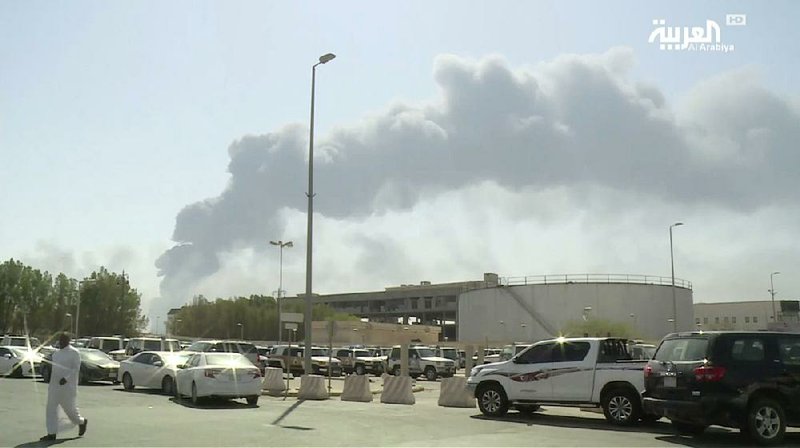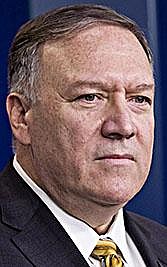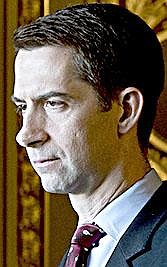DUBAI, United Arab Emirates -- Drone attacks claimed by Yemen's Houthi rebels struck the world's largest oil processing facility in Saudi Arabia and a major oil field Saturday, sparking huge fires and halting about half of the supplies from the world's largest exporter of oil.
The attacks were the latest of many drone assaults on the kingdom's oil infrastructure in recent weeks, but appear to be the most damaging. They raise concerns about the global oil supply and likely will further increase tensions across the Persian Gulf as the crisis escalates between the U.S. and Iran over its unraveling nuclear deal with world powers.
The attacks resulted in "the temporary suspension of production operations" at the Abqaiq oil facility and the Khurais oil field, Energy Minister Prince Abdulaziz bin Salman said in a statement carried by the state-run Saudi Press Agency. The fires "were controlled," the statement said, and no workers were injured.
The fires led to the interruption of an estimated 5.7 million barrels in crude supplies, according to the statement, which said part of that would be offset with stockpiles. The statement said Saudi Aramco, the state-owned oil giant, would provide updated information in the next 48 hours.
The statement did not give any timetable on how long the production could be curtailed. In Washington, the Department of Energy said that the United States was prepared to tap U.S. emergency oil reserves if necessary to cover supply disruptions.
The Iranian-backed Houthis, who hold Yemen's capital, Sanaa, and other territory in the Arab world's poorest country, took responsibility for the attacks in the war against a Saudi-led coalition that has fought since 2015 to reinstate the internationally recognized Yemeni government.
[Video not showing up above? Click here to watch » https://www.youtube.com/watch?v=mQefB3IHw1Q]
But the U.S. blamed Iran, with Secretary of State Mike Pompeo tweeting, "There is no evidence the attacks came from Yemen."
"Iran has now launched an unprecedented attack on the world's energy supply," Pompeo added.
In a short address aired by the Houthis' Al-Masirah satellite news channel, military spokesman Yahia Sarie said the rebels sent off 10 drones after receiving "intelligence" support from those inside the kingdom. He warned that attacks by the rebels would only get worse if the war continues.
"The only option for the Saudi government is to stop attacking us," Sarie said.
Saudi Arabia said it was still trying to determine who had carried out the attacks, despite the Houthi claim.
Col. Turki bin Saleh al-Malki, a spokesman for the Saudi-led military coalition, said in a statement that physical evidence was collected but that "investigations are ongoing to determine the parties responsible for planning and executing these terrorist attacks."
First word of Saturday's assault came in online videos of giant fires at the Abqaiq facility, some 205 miles northeast of the Saudi capital, Riyadh.
The attacks hit deeper into Saudi territory than most previous Houthi strikes and set off blazes with smoke that could be seen from space.
President Donald Trump called Saudi Arabia's Crown Prince Mohammed bin Salman to offer his support for the kingdom's defense, the White House said. The crown prince assured Trump that Saudi Arabia is "willing and able to confront and deal with this terrorist aggression," according to a news release from the Saudi Embassy in Washington.
The U.S. Energy Department said in a statement Saturday night that the U.S. "stands ready to deploy resources from the Strategic Petroleum Oil Reserves if necessary to offset any disruptions to oil markets" in the wake of the attacks.
The department said Energy Secretary Rick Perry also has directed the department to work with the International Energy Agency on potential available options for collective global action if needed.
U.S. Sen. Tom Cotton, R-Ark., issued a statement Saturday after reports of the attacks.
"The United States stands with our Saudi partners in confronting Iran's campaign of terror across the Middle East," Cotton said. "The ayatollahs' desperate efforts to cripple global energy markets will only renew our commitment to maximum pressure. The Iranian regime and its proxies ought to face consequences for these attacks."
HUGE OPERATION
Saudi Aramco describes its Abqaiq facility in Buqyaq as "the largest crude oil stabilization plant in the world."
The facility processes sour crude oil into sweet crude, then transports it to transshipment points on the Persian Gulf and the Red Sea or to refineries for local production. Estimates suggest it can process up to 7 million barrels of crude oil a day. Saudi Arabia produced 9.65 million barrels of crude oil a day in July.
"This is one of the biggest central processing facilities in the world. The Iran conflict is going to be hitting the world in a new way," said Kevin Book, a managing director at ClearView Energy Partners LLC.
The Khurais oil field is believed to produce more than 1 million barrels of crude a day. It has estimated reserves of more than 20 billion barrels, according to Aramco.
There was no immediate impact on global oil prices as markets were closed for the weekend. Benchmark Brent crude had been trading at just above $60 a barrel.
While Saudi Arabia has taken steps to protect itself and its oil infrastructure, analysts had warned that Abqaiq remained vulnerable. The Rapidan Energy Group, a Washington advisory group, warned in May that "a successful attack could lead to a monthslong disruption of most Saudi production and nearly all spare production." It called Abqaiq, close to the eastern Saudi city of Dammam, "the most important oil facility in the world."
The group said repairing the operation could take months.
"A successful attack on Abqaiq is about the worst thing energy security planners think about," because the specialized equipment there would be difficult to quickly replace, Robert McNally, Rapidan's president and a former White House energy adviser under President George W. Bush, said in an interview.
He added that this attack is "likely to put on ice" talk of easing sanctions on Iran, with the consequences depending on how closely Tehran can be linked to the attacks.
"Forget about easing sanctions," he said. "We are talking about a step up on geopolitical risks."
In a report published Saturday, Helima Croft, global head of commodity strategy at RBC Capital Markets, noted that although Aramco officials have indicated that exports will resume in the next few days, "there is nothing to suggest that this is a one-off event and that the Iranian-backed Houthi rebels will forgo further strikes on Saudi sites."
The war in Yemen began in 2014 when the Houthi rebels seized control of the capital and most of Yemen's northwest, sending the government into exile. A coalition of Arab nations led by Saudi Arabia and the United Arab Emirates, with some support from the United States, began bombing Yemen in 2015, hoping to push the Houthis back and restore the government.
Instead, the war has settled into a stalemate and the Houthis have developed increasingly sophisticated ways of striking back at Saudi Arabia.
Houthi rebels have been using drones in combat since the start of the Saudi-led war. The first appeared to be off-the-shelf, hobby-kit-style drones. Later, versions nearly identical to Iranian models turned up. Iran denies supplying the Houthis with weapons, although the U.N., the West and Gulf Arab nations say Tehran does.
U.N. investigators said the Houthis' new UAV-X drone likely has a range of up to 930 miles. That puts the far reaches of both Saudi Arabia and the United Arab Emirates in range.
Houthi attacks, including on civilian airports and oil installations, have become more frequent in recent months, leading to Saudi accusations that Iran has prodded the rebels into opening a new military front during Tehran's worsening confrontation with regional adversaries.
The Houthis have acknowledged their alliance with Iran but denied acting on Tehran's orders.
The war has become the world's worst humanitarian crisis. The violence has pushed Yemen to the brink of famine and killed more than 90,000 people since 2015, according to the U.S.-based Armed Conflict Location & Event Data Project, which tracks the conflict.
Information for this article was contributed by Jon Gambrell, Samy Magdy, Anne D'Innocenzio and staff members of The Associated Press; by Ben Hubbard, Palko Karasz and Stanley Reed of The New York Times; and by Kareem Fahim, Steven Mufson, Jeanne Whalen and Brian Murphy of The Washington Post.
A Section on 09/15/2019


